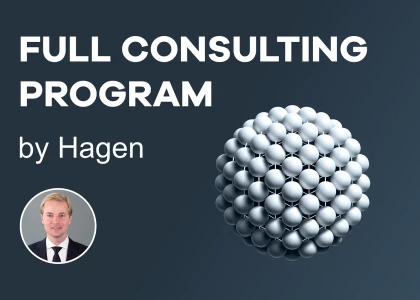What type of mistakes would be acceptable/unacceptable, and how frequently would you be able to make them while keeping a “satisfactory” performance?
How many mistakes can you make in a case and still be successful?


Hi there,
I think this is an interesting question that may be relevant for many people. I would be happy to share my thoughts on it:
- I feel like you have the wrong idea about how to assess interview performance in general. Contrary to what another coach said, it is not about counting specific types of mistakes you need to avoid while showing leniency with other types of mistakes. Instead, assessing interview performance, as with all other industries and positions, is about determining whether the candidate showed potential to succeed in this position, across several dimensions. If this is the case, the concrete number of mistakes you made does not necessarily matter that much.
- Still, when you make a mistake, I would highly advise you to take extra care about the underlying skill for the next interview. While making a single mistake does not matter that much, repeating the same mistake across interviews and thus showing a pattern of weakness on a specific skill is something you would want to avoid as it shows a lack of preparation and/or ability to learn.
If you would like a more detailed discussion on how to address your specific situation, please don't hesitate to contact me directly.
Best,
Hagen

Seven.
Jokes aside, please stop thinking about things in black and white.
It depends on what type of mistake you make.
It depends on how you handle the mistake.
It depends on how well you did on everything else
I have an 8 “criteria” case assessment sheet I use for my candidates. You need to do “well” across all categories to pass. Can you make a math mistake? Yes. Can you have an “average” framework? Yes. But, this is a hollistic assessment of the candidate.
You also have to remember you can be a 10/10 and still fail. It might be because of your background, the other candidates interviewing, whether the interviewer liked you or not, the recruiting channel etc.
You can also be a 5/10 and pass.
Here's the simple fix: Just do the best you can.
Here's a sentence of an optimal candidate:
Someone who can approach a complicated problem and think + communicate in a structured way in the right context+objective of the case, while being personable, adaptable, and coachable, so that, ultimately, the interviewer can see themselves working with this individual and putting them in front of a client.
Please read this to shift your mindset on casing:
https://www.preplounge.com/en/articles/pitfalls-case-interview-preparation
https://www.preplounge.com/en/articles/how-to-shift-your-mindset-to-ace-the-case

Hi there,
This is not how interviews are evaluated.
There are a number of factors that interviewers look at to create a holistic 360-degree assessment. Rather than looking at the number of mistakes, interviewers look for two things:
- Do you have the strengths and spikes across several dimensions (e.g., problem-solving, analytics,…) that make you offer-worthy?
- Are you solid enough through the rest of the skills you display to prevent a rejection straight away?
If you move through the case in a clean manner without any mistakes yet without a wow-factor (e.g., exceptionally deep thinking, creativity), you will not get the offer. If you move through the case and demonstrate strengths and spikes, then make one or two mistakes or the interviewer had to guide you a bit, you will be more likely to get the offer.
I describe this logic in greater detail in my book.
That being said, mistakes should be avoided (for obvious reasons) but once again, do not automatically lead to rejection if you meet the rest of the criteria.
Cheers,
Florian

Hi there,
In my experience, there are 2 main scenarios that lead interviewers to view a candidate's case performance as positive and worthy for advancement
- Obvious scenario:
The candidate solves the case with little to no guidance, offers critical thoughts to enable a discussion that touches upon a variety of dimensions of the case and is robust in the quantification of the results (correct calculations, pragmatic estimations where appropriate) - Secondary scenario:
The candidate is able to take the interviewer's feedback and hints to course-correct an initially false approach or logic, re-evaluates own assumptions/conclusions in the process and pivots toward the correct approach which is then driven home across the finish line by the candidate (overall correct math also matters of course)
On the flipside, if a candidate only offers a slow piecemeal solution with very limited scope of critical thinking, requires a lot of guidance from the interviewer to keep moving and drive towards the essence of the case question, does not maintain a good “numbers hygiene” during the case or does not incorporate the interviewer's feedback in their thought process, then it's viewed as a poor case performance.
So it's not about a strict numbers count on how many “mistakes” you are allowed to make. It's about the broad picture whereas an increased number of “mistakes” undermines a candidate's credibility of course.
I hope this was helpful
Hello A,
There are some types of mistakes that are generally considered unacceptable and could negatively impact your performance, such as:
- Misunderstanding the client's problem or needs
- Failing to identify or prioritize the key issues in the case
- Making incorrect assumptions or using inaccurate data
- Providing a flawed analysis or recommendation
- Struggling to communicate your ideas clearly and succinctly
- Not adapting your approach to new information or changing circumstances
On the other hand, some mistakes may be more forgivable or even expected during the case cracking process, especially if you are able to quickly correct them and demonstrate strong problem-solving skills. For instance, you might make a small error in your calculations, but catch it yourself and quickly correct it, or you might initially overlook an important piece of information, but then ask follow-up questions to gather more details and refine your analysis.
Overall, the frequency and severity of mistakes that are considered acceptable will depend on the specific consulting firm and the expectations of the interviewer. However, in general, demonstrating a strong ability to problem-solve and adapt to new information can help mitigate the impact of any mistakes that you might make during the case-cracking process.
Best of luck!

Hi,
I think Florian has a really great and insightful answer that really captures the interviewer's POV.
Nobody is perfect, but consulting firms want someone who is outstanding. I can share a personal anecdote to highlight this point:
- In my early days of interviewing, when I was being shadowed by someone more senior, I had one interview where I was not sure of how to evaluate the candidate
- The candidate did not make any glaring mistakes, but at the same time really did not show any deep insights or outstanding points or traits
- I was not sure whether to pass the candidate, which is when the senior said this to me, “Why would you want to work with [someone who is] Average?”
If you understand the grading / evaluation metrics, you will know that the scores are not given necessarily based on ‘mistake vs no mistake’. It is as Florian says, a holistic assessment.

Hi there,
There are no set guidelines for interviewers in terms of ‘how many mistakes are deemed acceptable’.
I've made mistakes even in my final interview and still got an offer.
What they're rather interested in is:
- how you think
- what kind of person you are
If there's one thing you should focus on during the interview is not such much doing everything ‘right’ but instead actually connecting with the interviewer.
Best,
Cristian

Agree with other coaches here!
Best,
Rushabh














